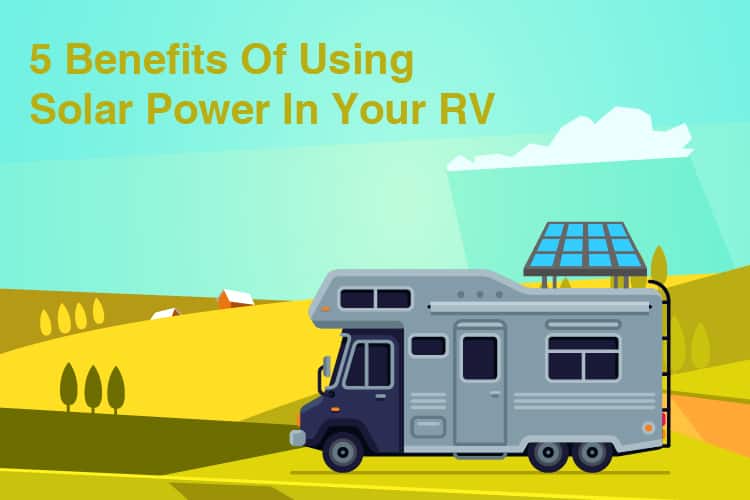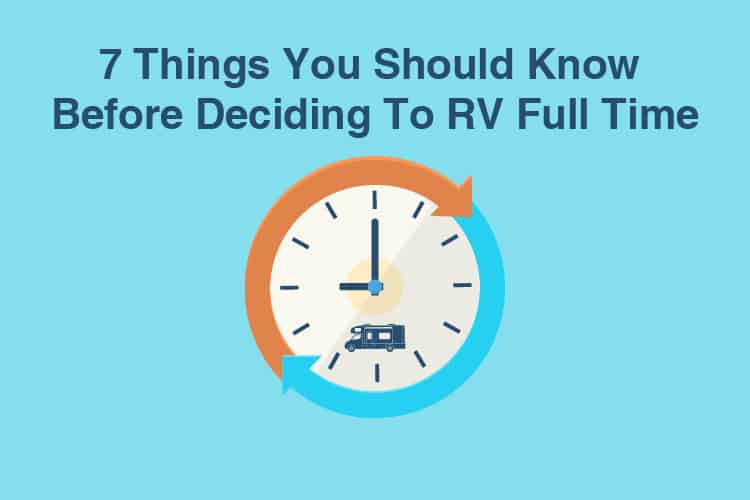If you’re planning on taking your RV on a beautiful trip to the great outdoors, then you need to make sure you have everything you need in case of an emergency.
I’m not talking about food or toilet paper or antiseptic wipes, I’m talking about your RV’s emergency needs.
A generator is an essential piece of equipment that any RV owner should carry with them.
Even if you travel to a resort or RV park, the generators they have there might not be a great match for your vehicle.
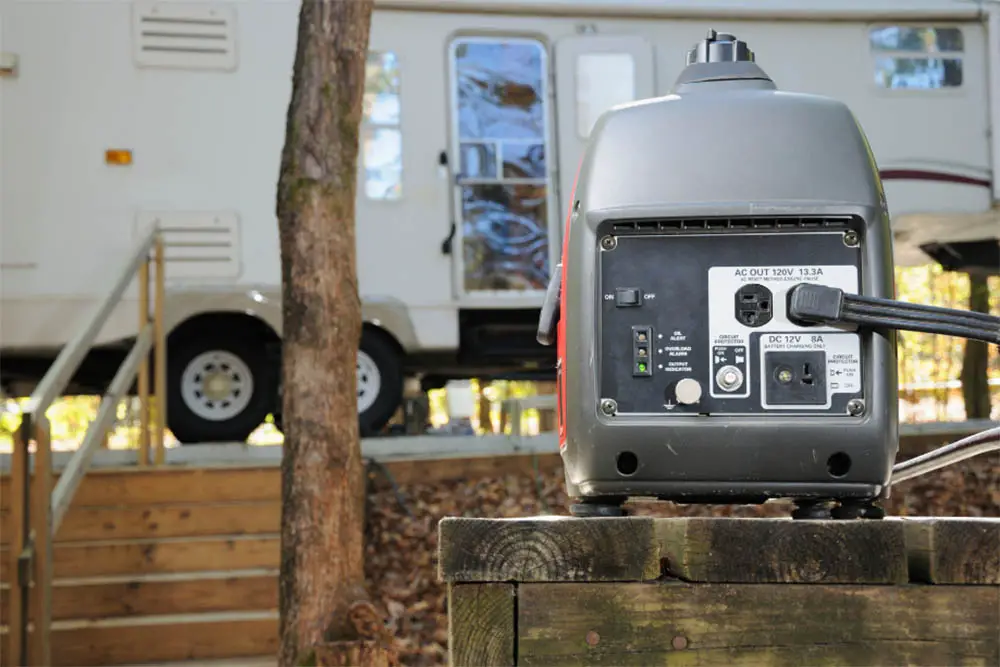
That doesn’t mean it will wreck your RV, but it might take longer to get you the power that you need.
There is quite a bit of knowledge on the internet to help you learn what’s best for your RV, but it’s often in bits and pieces, scattered throughout the masses.
What I’ve done is gather all that information, make it understandable so anyone can understand it (not just the RV buffs), and put it all into this complete guide to 50 Amp RV generators.
I’m going to explain what you need to know before you buy a generator for your RV, what you personally should be considering depending on what kind of experience you want to have, and I’ll even give you a list of 5 great generators for you to pick from using the information you’ll have just learned.
It’s knowledge made easy, so you don’t have to do any leg work.
If all of that still sounds like too much hassle I can give you my quick answer to what size generator you need for your 50 amp RV.
As a minimum, you should buy a 4,000 watt generator for a 50 amp RV.
That answer doesn’t take into consideration your appliances or any other factors that I’ll be going into detail about later, but if it was a quick answer that you wanted, it was a quick answer that you got.
Most of the generators in my top 5 are over 4,000 watts so if you want to continue on to a speedy buy, jump down to the Top 5 Best Generators For Your 50 Amp RV section.
For everyone else, I’m going to explain what you need to know before you buy a generator!
What Do I Need To Know Before Buying A Generator For A 50 Amp RV?
Like I said before, 4,000 watts is the minimum you need for a 50 amp RV, but that doesn’t take into account how much power your RV and its appliances actually need.
The way we figure that is by considering each part of your RV and how much wattage is actually being used.
Knowing this will help you figure out if you are looking at a generator that is unnecessarily high in wattage, or a generator that will stop working once you put the toaster on.
What Is The Maximum Wattage That A 50 Amp RV Uses?
Finding out this answer will tell you where you can stop on your search for a generator.
As it turns out, this problem has a simple answer because we already know that we are looking at a 50 amp RV.
Normally what you do is multiply the amps by the volts. We know the amps are 50 and I know that 50 amps use two 120 volt hot wires. So 50 times by 120 is 6,000 watts.
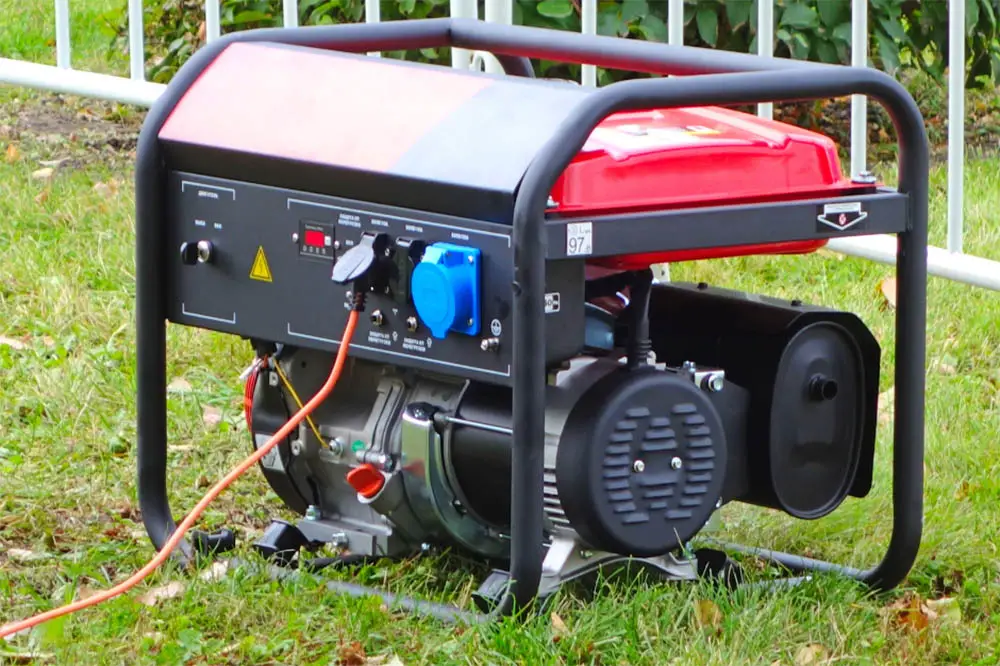
Because the amps have two hot wires we need to double that figure so the actual answer is 12,000 watts.
To make it easier, the formula is (50 amps x 120 volts)x 2 hot wires. Meaning the maximum wattage that a 50 amp RV uses is 12,000 watts.
Double check that against your own RV and adjust the numbers as appropriate if it turns out your hot wires or voltages are different.
If you’re not sure where to find that information, then have a look at the RV’s manual or on a label.
The manufacturers have to give you this information to help you pick equipment safely, including a generator.
Knowing the maximum that your RV can handle doesn’t mean that you should jump to a 12,000 watt generator. 12,000 is a very high number so it would be very expensive to buy, especially if you don’t actually use that much power. So now we have to figure out how much electricity you actually use.
How Many Watts Do My Appliances Use?
This part of the decision process comes down to you.
I can’t give you a generic number or an accurate number like I’ve done before, because I don’t know what you use in your RV.
So for this part, take out a calculator and add up the wattages of all the appliances you see in the table below.
The wattages I’ve given you are an average, so yours might be more or less than what I’ve suggested.
The best way to get the most accurate figure is to look at all of your appliances, find the label which states the wattage on each one and add them all together to get your wattage usage.
If you’re happy to use an estimate, then continue with my table.
The “Starting Wattage” is the amount of electricity your appliance uses when you turn the power on.
The “Running Wattage” is how much electricity your appliance uses to keep it on. Normally the “Starting Wattage” is the highest of the two, so this is the one which you should add together.
| Appliances | Starting Wattage | Running Wattage |
| Blender | 850 watts | 400 watts |
| Coffee Maker | 800 watts | 800 watts |
| Laptop | 250 watts | 250 watts |
| Microwave | 1,500 watts | 1,500 watts |
| Radio | 200 watts | 200 watts |
| RV Inbuilt Refrigerator | 600 watts | 180 watts |
| Satellite Dish/Receiver | 250 watts | 240 watts |
| Toaster | 1,150 watts | 1,150 watts |
| Television | 600 watts | 600 watts |
There may be appliances that I have missed that are essential to your RV, so make sure you add up every appliance you will be taking with you.
You may have noticed that I haven’t included the actual RV in these tables, but don’t worry because we are going to figure that part out now.
How Many Watts Does It Take To Power Just The RV (No Appliances)?
To power your RV with no appliances at all, no air conditioning, no refrigerator, no radio, etc you will need only about 100 watts.
But most of the things that come with your RV cannot be disconnected without a little help.
If you are someone who is trying to live off the grid with minimal electricity, then that low wattage might be music to your ears, but to most of us, that tiny number isn’t something to consider.
Instead, we need to factor in all of the in-built appliances that come with our RV, even if we don’t bring anything else.
The most draining in-built appliance that your RV has is the air conditioning. Lots of RVs don’t have just one, but two of these energy drinkers.
So before I show you the next lot of tables, you need to figure out how many air conditioners you have, and what their size is.
Sizes are measured using a term called British Thermal Unit or BTU. You should be able to find their size in your RVs manual or on a label attached to the air conditioner itself.
Once you’ve noted that down, have a look at the starting and running wattages your air conditioners use.
| Air Conditioner Size | Starting Wattage | Running Wattage |
| 7,000 BTU | 1,700 watts | 600 watts |
| 10,000 BTU | 2,000 watts | 700 watts |
| 13,000 BTU | 2,700 watts | 1,250 watts |
| 15,000 BTU | 3,500 watts | 1,500 watts |
Now you’ve added all of the numbers up, you should have a new maximum wattage for your RV which is accurate for you and your usage.
The thing is, you probably aren’t going to use all your appliances at the same time, and in all honesty, you shouldn’t use them all at the same time either.
It can run your battery down and it’s not good for the environment.
If you add up all your watts and find you are just over the number of wattages needed for the generator you want, then you should still buy it.
Just remember not to run all of your appliances at the same time. Turn the air conditioner off when it’s not needed.
Don’t leave the TV on stand by. And you definitely don’t need a TV and a radio on at the same time. Check out our overview of our top 12 volt TVs.
These are the types of things you probably already think about, even if it’s subconsciously.
So it might not be that much of a stretch to make yourself energy conscious when you travel in your RV.
If you would rather buy the generator and not remember all this wattage information, then I suggest you buy the generator that can handle all of your electrical needs, even if it ends up being more powerful than you actually need it to be.
Sometimes a worry free mind is worth more than a money saving generator.
5 Best Generators For Your 50 Amp RV
And there you have it! Research completed! You know what you need to look out for in terms of wattage, and you know what matters to you in terms of features.
Now to see what is out there! I’ve compiled a list of 5 great generators, so now all you need to do is see which one ticks all your boxes.
Most Lightweight Generator – Generac
 Check Latest Price
Check Latest Price
If you are worried about a generator weighing down your RV, then you should go with a lighter choice.
The gas powered Generac only weighs 74.3 pounds. That isn’t a weight that you can hold for ages, but when it comes to generators, the Generac is pretty light.
This also means that the Generac is relatively small and quiet in comparison to the other generators I have to show you.
With a height of 16.4 inches and a length of 19.3 inches, the Generac is a very compact generator, so you can pack it away with ease.
Because this generator is so small and light, it doesn’t produce as many watts as the others. It has a Running Wattage of 3,000. Making it the lowest wattage on our list.
Earlier I mentioned that you really want a generator with at least 4,000 watts, but that was when I was talking generically.
After all the calculations we did, you might have realized that 4,000 watts are unnecessary for you. If that’s the case then this small wattage might be perfect!
PROS
- Lightest
- Compact Size
- Quite
- Parallel Connections
CONS
- 3,000 Watts
- Manual Start
Quietest Generator – Champion Power Equipment
 Check Latest Price
Check Latest Price
The gas powered Champion Power Equipment has a decibel level of 64 dB(A) which is the same as level as a normal conversation.
It is the quietest generator on my list and can last for up to 17 hours! Unlike the Generac, this quiet generator isn’t held back by power.
The Champion has a wattage of 4,000 which is just the right amount of power for most RV users.
Another pro to add to the Champion’s list is that it has the ability to be used in parallel with other Champion generators.
So if you did want some more power onboard, then you can power it with any of Champion’s smaller or bigger generators.
I had to search for a negative for this generator, and the only thing I can think of is its pull recoil starting type.
The best starts are the electric start generators because all you need to do is press a button.
The Champion (and all but two other generators on this list) is a manual starter. This means you need to pull the coil to make it work.
This isn’t a huge negative, but I know there are easier starts on the list.
PROS
- Quietest
- 4,000 Watts
- Parallel Connections
- Cheapest
CONS
- Manual Start
Most Versatile Generator – DuroStar
 Check Latest Price
Check Latest Price
I’ve called the DuroStar the most versatile generator because it has 4 different types of outlets ready for any type of equipment or appliance you need.
This means you can plug your RV into the generator, but also a host of other electronics too.
And don’t worry about the power because the DuroStar has a wattage of 10,000!
Another reason that the DuroStart is crowned the most versatile is because of the additional tools you are given.
The Durostar is heavy (130 pounds) so it needs wheels to make it portable.
Knowing that the wheels are important, the Durostar gives you a wheel kit, a tool set, and a bunch of other helpful additions so nothing can stop you on your vacationing adventures.
My only wish is that the generator was dual powered so that it could be versatile in every respect.
Its fuel isn’t a real negative though, as the DuroStart is powered by gas, which is probably the same as your car, so you don’t have to fill up twice.
PROS
- 4 Different types of outlets
- Extra Wheel Kit
- 10,000 Wattage
CONS
- Heavy
Easiest To Start Generator (Electric Start) – Pulsar
 Check Latest Price
Check Latest Price
I’ve talked about this a couple of times now, but I cannot stress the ease of an electric start generator. Flip a switch and boom the power is there.
I feel like a 17th century scientist whilst I’m writing this but eureka we have power!
This easy start is needed when the generator itself weighs 209 pounds! After lugging this power house around you want something simple to get the ball rolling.
That being said, the Pulsar does have wheels, so it’s not really a big deal unless you need to pick it up.
In terms of power, the Pulsar has a wattage of 12,000 which is our most powerful generator tying with Duromax, our last generator.
The Pulsar also has a Dual Fuel ability meaning you can use both gas and LPG (which is the same name for propane), so you can have your pick of cheapest or most available fuel.
With all of these attributes, you’d expect the price to be ridiculously high too, but it’s actually a tad cheaper than the DuroStar.
In all honesty, the Pulsar is my favorite!
PROS
- East To Start (Electric Push Button Start)
- 12,000 watts
- Wheels
- Dual Fuel (Gas & Propane)
- Reasonably Priced
CONS
- Heavy
Overall Best Generator – DuroMax
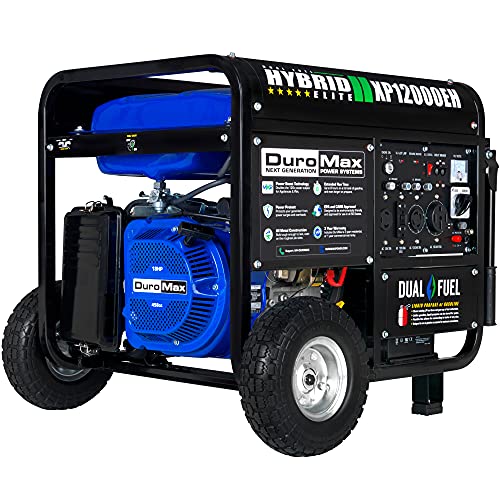 Check Latest Price
Check Latest Price
Do you want something quiet, with a lot of different outlets, has a high wattage, and is easy to start? Then I should introduce you to DuroMax.
With a sound level of 72 dB(A), using the DuroMax will sound like being in a car, not totally quiet but not that loud either.
The DuroMax has the same amount and style of outlets as the DuroStar, they are from the same company after all.
Being from the same company means they both have some of the same perks like a wheel kit, tool set, and oil funnel.
The wattage of the DuroMax is 12,000 matching the Pulsar, and also like the Pulsar the DuroMax has an electric start button to make the starting up process super easy.
Pulsar and DuroMax also have another thing in common and that is the Dual Fuel gas and propane useability.
You might be wondering why I even put the Pulsar in the mix with DuroMax being so similar, but the reason is to do with price.
The DuroMax is the most expensive generator on our list, which makes sense seeing as it can do what all the others can and more.
PROS
- East To Start (Electric Push Button Start)
- 12,000 watts
- Wheels
- Dual Fuel (Gas & Propane)
- Reasonably Priced
CONS
- Heavy
Buyer’s Guide
What Are The Most Important Features To Consider For My RV’s Generator?
Now that you’ve figured out the number of wattages that you need for your generator, it’s time to look at the general features a generator has.
Some points might matter more to you than others, but each one has its own pros and cons. Make a note, so when you start looking at generators you know which features to look out for,
The Weight of a 50 Amp RV Generator
Your generator is going to power your RV, a little moving home. It needs to have a lot more power than most generators, which means that it is going to be heavy.
Because this is inevitable, a lot of generators come with wheels. The wheels make the generators portable. If the portability of your generator matters to you, then you should consider getting one with wheels.
Another thing to consider is how easy it is to fix or replace a wheel that is broken. A repair kit or tool set can keep you going if your generator gets stuck in a rut.
But if you plan on putting your generator down and rarely picking it back up again, then the weight and portability of your generator might not be that important to you.
Does The Generator Have A Parallel Connection?
Because the wattage that you need is generally quite high, some generators offer a parallel connection between one generator and another generator of the same make and model.
This basically means that you have two (or more) generators connected together which increases the wattage that powers your RV.
There are two great things about a generator that has a parallel connection. The first is that if one stops working, you can turn off the non essential appliances and keep using the second generator.
And the second is that if you decide you want more appliances and need another generator, you already have the parallel connection ready.
The bad thing about a parallel connection is that it uses up more width space than other types of generators. If you haven’t got that much space, then you might prefer to use normal generators.
What Fuel Should I Power My Generator With?
I would recommend that you buy a generator that uses the same fuel as your RV.
This isn’t for any reason other than accessibility. If they have the same fuel then you can fill one canister for both machines and not worry about accidentally giving one machine the wrong fuel.
That being said, generators are commonly powered by gas, propane, or diesel, but you can also get “dual fuel” generators, electric generators, and solar powered generators.
Solar powered generators get their fuel from the sun’s rays which makes them cheap to refuel (but often more expensive to buy), “dual fuel” generators can run on more than one type of fuel making them more flexible in places where there are fuel shortages, and electric generators need to be charged up at home before you set off on vacation. Check out here our comparison between solar panels and generators for your RV.
Will The Generator Be Loud?
You can get generators which have “quiet technology”. This won’t make your generators completely silent but there is a noticeable difference between generators with this technology and those without.
For a comparison, generators with quiet technology can run with a sound of 55 decibels which is the same level as an electric toothbrush.
Whereas most generators have sounds of 85 decibels or higher. 85 decibels sound the same as a lawnmower!
If you need your generator to be using its full capacity, then the advertised noise level might be higher than you expected.
This matters if you’re a light sleeper or are camping in a place that might upset your neighbors. But if you’re happy with a little background noise, then it’s nothing to worry about.
Conclusion
The wattage is the most important thing for you to figure out, which is also why I couldn’t tell you exactly what you needed. By now you should have a list of wattages ready for if you ever need to buy another generator.
Save this page as a bookmark so you can have an easy to find table of average wattages for the day when a new appliance comes along on the journey with you.
You should also have figured out what matters the most to you. Is it weight? Ease? Fuel? Noise Level? Everyone is different, which is why there are so many generators out there.
With my top 5 picks for an RV generator, you already have a small list to search through, but if none of them seem right to you, you also have the knowledge to search on your own!


